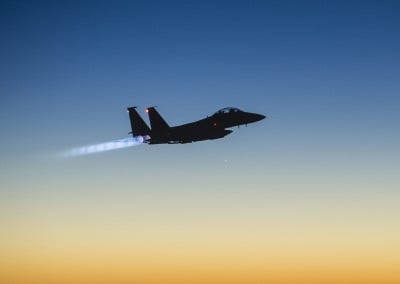‘Blank Check to Kill with Impunity’: Trump to Quietly Scrap Drone Restrictions
Human rights groups argue the move could lead to an upsurge in civilian casualties, which are already soaring under Trump

President Donald Trump is reportedly gearing up to roll back even the most limited restrictions on U.S. drone operations overseas, further opening the door for the expansion of airstrikes and commando raids into nations like the Philippines and Nigeria and setting the stage for an upsurge in civilian casualties—already at record highs in Afghanistan and soaring in Iraq, Syria, and Yemen.
Zeke Johnson, senior director of programs for Amnesty International USA, told the New York Times in an interview that while Obama-era restrictions on drone strikes “fell far short on human rights protections,” any move to water down drone warfare rules even further would be a “grave mistake.”
The White House appears to be committed to the move nonetheless, the Times reported on Thursday, noting that the plan “has quietly taken shape over months of debate among administration officials and awaits Trump’s expected signature.”
The Times notes that at least two rules are on the chopping block:
- “First, the targets of kill missions by the military and the CIA, now generally limited to high-level militants deemed to pose a ‘continuing and imminent threat’ to Americans, would be expanded to include foot-soldier jihadists with no special skills or leadership roles.”
- “And second, proposed drone attacks and raids would no longer undergo high-level vetting.”
The plan, in effect, would deepen American military involvement in nations considered to be beyond combat zones and allow the U.S. military—and the CIA, which has for months lobbied for more drone authority—to target individuals that are not even deemed national security threats by the U.S. government.
“[D]rone operators and commanders would face fewer internal hurdles to launching specific strikes or raids,” the Times concluded.
As Common Dreams reported last month, Trump has repeatedly shown a willingness to bow to endless war advocates, as he did in his speech outlining the White House “strategy” for the 16-year-war in Afghanistan. Central to his address was the promise to lift restrictions on military operations and “expand authority for American forces.”
With his expected drone rule rollback, Trump appears to be moving closer to fulfilling this promise.
According to a recent analysis by the human rights organization Reprieve, the Trump administration’s more belligerent and less accountable foreign policy is already having devastating consequences. Trump, the group notes, “has overseen a projected fivefold increase in drone strikes” in Yemen, the site of a U.S. assassination campaign that “eclipses all that came before it in scale and brutality.”
Johnson of Amnesty International noted in a statement late Thursday that Trump’s ability to expand the use of lethal force abroad is due to the “legally and morally murky” policies that were put in place and maintained by his predecessors, and sustained by a Congress that refuses to debate the merits of the endless “war on terror.”
Thus, any proposal that “gut[s] already weak human rights protections” that restrain American forces abroad “would be unacceptable,” Johnson concluded.
“The Trump administration needs to ensure that its guidance for operations outside armed conflict comply with human rights law. The administration cannot write itself a blank check to kill with impunity.”
This work is licensed under a Creative Commons Attribution-Share Alike 3.0 License

